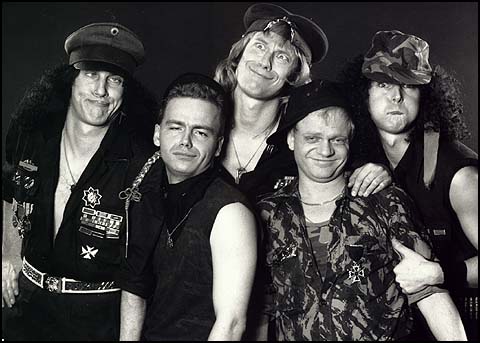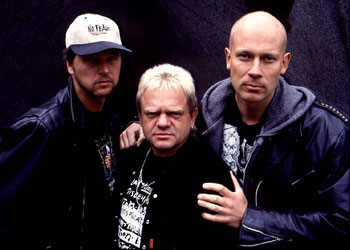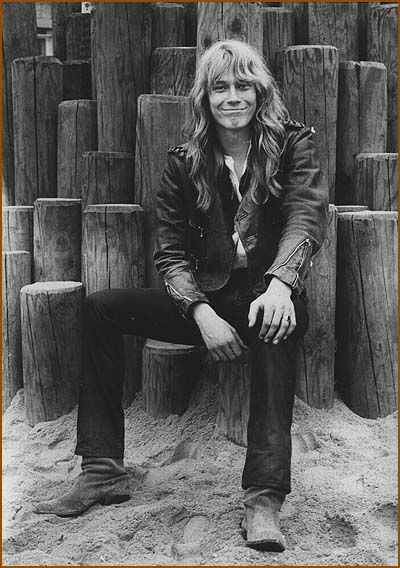|
FIBM: Describe a typical day in the life of Wolf Hoffmann during the early to mid eighties.
Wolf Hoffmann: Um...it's all different of course. When you are on tour, it's different from when you are home. Recording, I was never one to
wake up at noon or something, I would get up early. I don't know, every day was different.
FIBM: Well you guys weren't a drugged out band.
Wolf Hoffmann: Hell no....Never even smoked pot.
FIBM: You're kidding?
Wolf Hoffmann: No, never even had a joint in my life.
FIBM: But you guys drank right?
Wolf Hoffmann:
Yeah, but not excessively. We're like almost boring, in that regard.
FIBM: That's probably good, because...
Wolf Hoffmann:
I'm still around.
FIBM: Yeah, I saw some pictures of you and thought that you still looked the same, other than you now shave your head.
But some of these guys, from the 80's, look very worn down.
Wolf Hoffmann:
I know, I see them all the time.
FIBM: How has your catalog sold through the years?
Wolf Hoffmann:
I don't know.
FIBM: You still receive payments right?
Wolf Hoffmann:
Yeah.
FIBM: Well then you would know if they have sold well through the years.
Wolf Hoffmann:
Yeah, I mean it didn't sell millions, I know that.
FIBM: Any differences between crowds in Europe and crowds in America?
Wolf Hoffmann:
None. See we just did this reunion thing this year. First shows we've done in 10 years
and probably the last. So we are not really a working band as of now. Just now we have done
these huge festivals in Europe, where we had 50,000 in Germany and 35,000 in Sweden. So they
were huge, but those were festivals. We are bigger in Europe than the States.
FIBM: Back in the 80's were you able to survive on record sales alone, or was the band always
recouping?
Wolf Hoffmann:
Made a very good living, yeah. We have always been pretty smart about things.
FIBM: Probably because you guys were sober during it.
Wolf Hoffmann:
That has something to do with it.
FIBM: Didn't waste a lot of time in the studio?
Wolf Hoffmann:
No we have always been pretty german about everything, workaholics in a way. We never really went crazy like some of these guys,
who would rent a studio and don't show up..you always hear those stories about people wasting millions.....but then again,
we never made those millions, so we couldn't. But we did good, had a good time and made a good living at it.
FIBM: In 1985, Accept releases "Metal Heart". I thought this was your best sounding record. What were some of the things that Dieter did to
make that release sound so great.
Wolf Hoffmann:
Well, he is just an experienced producer and uh....I don't know, it's his secret, I guess. He is just very diligent and into details and did
a great job.
FIBM: How did he record the guitar tracks for Metal Heart?
Wolf Hoffmann:
Just the same way we all do. I didn't think that the guitars were all that outstanding on that record. Just experimenting, different
microphones and tweaking it until it sounds right. You know, there's no secret to it.
FIBM: So you don't agree that "Metal Heart" was your best sounding record?
Wolf Hoffmann:
Um...I thought "Balls" sounded every bit as good. I'm not sure which one is better, they were just different from each other.
FIBM: Well, more on the production side. I just thought that the record sounded so clean, but never lost any of the vibe...which can happen
when they start to sound that clean.
Wolf Hoffmann:
Right, right. We spent a lot longer on "Metal Heart" than we did on "Balls".
FIBM: How long did it take to record it?
Wolf Hoffmann:
Maybe 3 months, 4 months. A long time for us...I forget exactly, but it seemed forever.
FIBM: How long did it take to record "Balls to the Wall"?
Wolf Hoffmann:
3 weeks, 4 weeks..something like that.
FIBM: 3 fond memories of your days in Accept.
Wolf Hoffmann:
My top moment was probably coming back to Germany and playing the Monsters of Rock festival. We had toured in the US, for the last
eight months and we were in top shape and it was sort of a homecoming moment. Where we played these big ass
festivals in Germany called Monsters of Rock, with ACDC, some with Van Halen and all of the top dogs of that time. We were
on the bill and it was just an incredible vibe. Then, just recently, that was a top moment for me...first time on stage in ten years. It was
amazing, it was in St. Petersburg in Russia.
FIBM: How many people were there?
Wolf Hoffmann:
I don't remember...ten thousand, maybe.
FIBM: Really? It was a festival?
Wolf Hoffmann:
No, it is our own show.
FIBM: In 1986 Accept releases "Russian Roulette", what was the status of the band at that time? Were you pleased
with the record? Were you guys getting sick of each other?
Wolf Hoffmann:
Um...I guess we were a little bit. I don't know how to say it right...um...I guess the best way to say it is...
we kind of came to a point where we felt we needed a fresh start, we got sort of tired of the same old approach,
the songwriting, Udo didn't want to be part of it. It was a mutual agreement. We didn't kick him out and he didn't leave.
It was just a mutual thing, he wanted his own band. I guess for him, he wanted to be in more control of things. I think
that was the main reason. But we were ready to step up to another level and try something new and maybe go with a
different singer, but we did try and find somebody and we did find the right guy to be honest.
FIBM: Did Udo tour with you guys for "Russian Roulette"?
Wolf Hoffmann:
Oh yeah, that was maybe a year or two after "Russian Roulette" when he left.
FIBM: How was it playing with Udo again after all these years?
Wolf Hoffmann:
That was actually fantastic, it was great. It was a little bit difficult trying to convince him to do the shows. As I said before, he
has his own band now and I guess he just really loves being in control and being his own boss more than anything. We almost had
to beg him to do it and pay him and do all that kind of stuff. But once we were up on stage, it was awesome. We really had a good time.
FIBM: How many shows did you guys play?
Wolf Hoffmann:
About 25.
FIBM: Well surely Accept can sell a lot more tickets than Udo's solo band.
Wolf Hoffmann:
Yeah, about forty times more.
FIBM: I just don't get it.
Wolf Hoffmann:
You and the rest of the world don't get why he would be so difficult about this and I can't explain it, other than the fact that he
hates that we are so much more successful, even though he would be part of it. Maybe it's better than 25 percent of a lot.
FIBM: So that's it? No more Accept?
Wolf Hoffmann:
That's it, according to him and his people agreed on it.
FIBM: He actually said that he doesn't want to do Accept anymore?
Wolf Hoffmann:
Oh yeah, he said that from the get go. He gave us a time limit and only these months and then we had a couple of more shows and
we had to ask him, would you possibly do one more show.
FIBM: But you still get along with each other?
Wolf Hoffmann:
Oh yeah
FIBM: Tell us a little bit about your photography career. Are you still doing it?
Wolf Hoffmann:
Still doing that. I am having a bit of an inner struggle with that, because I love playing music so much more.
FIBM: But you have become quite a successful photographer though.
Wolf Hoffmann:
I hate to give that up. So I have two things, it's not a bad choice to have, but I have worked pretty hard in the
photography field, but my first love has always been music and I just sort of rediscovered that this year. How much fun it is and
that I almost feel bad if I don't play more.
FIBM: Well you're showing up in the music news a lot these days. I keep seeing your name pop up on the internet.
Wolf Hoffmann:
That has changed everything too, for the better in my mind. The whole internet thing. I really love that.
For me as an artist, it is just so unusual. Back in the old days the only feedback you would ever get would be
if you talked to someone directly, or the occasional letter. I don't really like writing letters, but everybody does
a quick email and I get those all the time from all over the world now. So you can get a much better sense about what
your music meant or means to the people. Which songs they really love and what they don't love, or questions they have. Totally
new experience, that I find super exciting and that really opened my eyes. Made me think, well shit, I need to really stick with it.
Honestly, there were years when I didn't know that I had that much of an impact on people. We never sold millions of records, so how
would you know.

THE FAST 5
FIBM: What is your most disgusting habit?
Wolf Hoffmann: chewing gum
FIBM: What is the most feminine thing you do?
Wolf Hoffmann: I'm not feminine at all...I don't wear high heels, stockings, none of that stuff....I sometimes sit with my
legs crossed like a woman.
FIBM: If there is a God, what is the first question you would ask God when you arrive?
Wolf Hoffmann: I have a really weird feeling about that one, I am not even sure there is one.
I don't know....what the hell took you so long?
FIBM: Greatest Rock band of all time?
Wolf Hoffmann: AC/DC
FIBM: What were you doing 40 minutes before you sat down to do this interview?
Wolf Hoffmann: I was actually giving another interview believe it or not.

|

